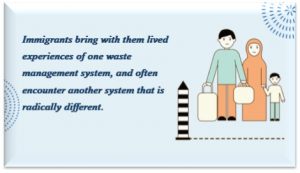November 27, 2024, by lzzre
Exploring waste management across borders: Bridging cultures and policies
Emma Etim, Doctoral Researcher, School of Geography, University of Nottingham
It began with a simple, yet profound moment back home in Nigeria. Watching children play near an overflowing dumpsite, I could not help but wonder about the invisible forces shaping this stark reality. As someone who grew up witnessing both the resilience and challenges of urban life in a developing country, waste was not just a nuisance; it was a constant backdrop for daily living. Years later, studying in England, I marvelled structured waste systems, yet found myself reflecting on their imperfections.
This contrast—two worlds dealing with the same issue in profoundly different ways—ignited a passion to understand how cultural norms, regulatory frameworks, and social behaviours intersect to shape waste management. This inspired my research, which seeks not only to explore these systems but also to find ways to learn from each other.
Municipal solid waste goes beyond trash piling. It is a living, breathing system of economic, technological, environmental, legal, cultural, and social factors, all of which are intertwined and affect each other. In this vast web of connections, we find complex challenges in municipal solid waste management (MSWM), such as regulatory instruments and the cultural and behavioural patterns that play their parts. At the University of Nottingham, my research which is Sponsored by Petroleum Technology Development Fund (PTDF) aims to investigate not only how waste is managed, but also how people think about it, act on it, and adapt to new systems when crossing borders.
This study seeks to understand how “practices can emerge, persist or change when connections between certain elements are made, sustained or broken” (Shove et al., 2012:9)
Nigeria, a developing nation, and England, which has an advanced waste system, face unique yet interconnected challenges. In Nigeria, systemic issues, such as inadequate infrastructure and informal waste practices, dominate. Whereas England grapples with fly tipping and public resistance to waste policies that are designed to improve sustainability.
This mixed-method research seeks to examine the extent to which immigration might serve as a lens to explore the intersection of regulatory instruments, culture, and behavioural patterns in waste management. This study seeks to combine surveys and interviews with waste stakeholders (policymakers, waste operators, council authorities, professional associations, immigrants, and residents). Thus far, over 1,300 survey responses and 25 interviews have been collected, with additional plans to enrich the dataset.
What changes in waste management behaviour might occur because of contact with culturally dissimilar people?
The movement of Nigerian immigrants to England and vice versa offers a fascinating opportunity to study how cultural practices influence the adaptation to new waste management systems. Using Acculturation Theory, this study shall explore how immigrants negotiate between their cultural norms and the waste systems of their host country. This understanding might help to reveal the broader role of culture in shaping environmental behaviour and inform more inclusive waste management policies.
Without paying attention to differences (as in specificity), identifying waste and discarding problems properly and aligning solutions for them will not succeed’ (Liboiron & Lepawsky, 2022:99).
In addition to acculturation theory, social practice theory shall be applied to understand waste behaviour as a part of daily life shaped by social, cultural, and material factors. By combining these theories, this study seeks to balance individual behaviour, agency and structural influence.
This study has the potential to reshape waste management systems by addressing cultural differences and structural barriers. For Nigeria, lessons from England’s systems may inspire better governance and infrastructure while avoiding the pitfall of replicating inappropriate practices. For England, insights into immigrant experiences can help to develop policies that are both effective and inclusive. This research is a journey toward fostering waste management systems that honour cultural diversity while addressing systemic inequities. By bridging the gap between policy and practice, and between cultures and contexts, we take a step closer to a cleaner and fairer future.
—
Stay connected for updates on the findings and join me in imagining waste management that transcends borders.
Recent publications
- Etim, E., Choedron, K.T. and Ajai, O., 2024. Municipal solid waste management in Lagos State: Expansion diffusion of awareness. Waste Management, 190, pp.261-272, https://doi.org/10.1016/j.wasman.2024.09.032.
- Etim, E., 2024. Leveraging public awareness and behavioural change for entrepreneurial waste management. Heliyon, https://doi.org/10.1016/j.heliyon.2024.e40063.
- Etim, E., 2024. Bridging the Gap: Transforming Waste Management Awareness into Action. Cleaner Waste Systems, https://doi.org/10.1016/j.clwas.2024.100173.
- Etim, E., et al., 2024. Systematic review of factors influencing household food waste behaviour: Applying the theory of planned behaviour. Waste Management & Research, https://doi.org/10.1177/0734242X241285423.
No comments yet, fill out a comment to be the first



Leave a Reply